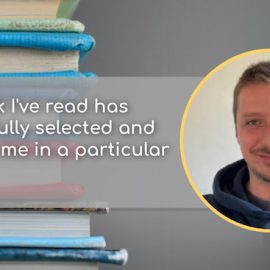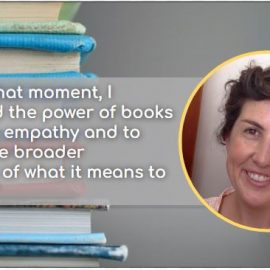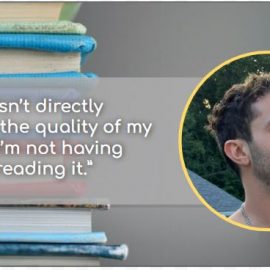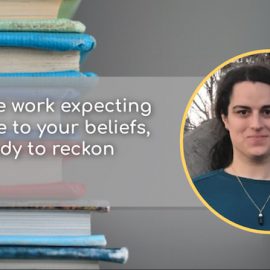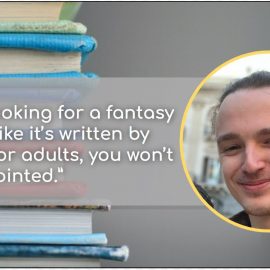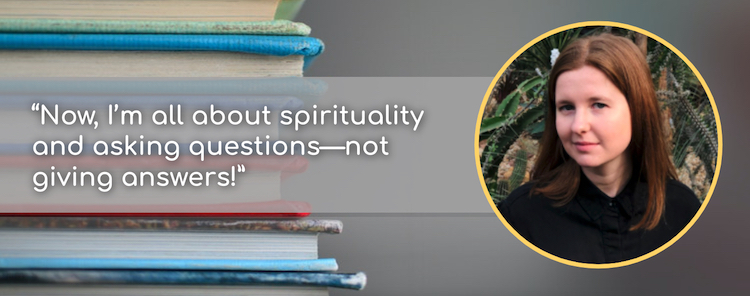
What book gave Bailey a record number of aha! moments? What helped her get more into books about history and economics?
Bailey could tell you all about it. Currently based in Scotland, she’s a book guide writer at Shortform. We interviewed her recently to learn a bit about her relationship with books.
Our Interview With Bailey
Bailey’s a self-proclaimed sucker for self-improvement and lifestyle books. Here’s what she had to say about some of her favorites—and more.
What’s your favorite book and why?
I adored Quiet, a book about intro- and extroversion. It validated my experience as a true-blue introvert and also helped me understand the needs and motivations of my extroverted friends better.
What are you reading these days?
Right now, I’m reading Eve’s Hollywood by Eve Babitz. I learned of her only because she passed away this year, but her writing seemed right up my alley, so I snapped up a copy of her most famous book. She writes about growing up in Hollywood in the 60s and 70s—what a wild and weird time and place!
Before that, I read The Art of Happiness, a book about the Dalai Lama’s views on how to achieve happiness. What a refreshingly simple—yet also frustratingly difficult—solution for how to be more contented.
And, right now, for Shortform I’m working on Stumbling on Happiness, which is about our inability to accurately predict what will make us happy in the future. It’s a great read—it’s helping me explain some poor decisions I’ve found myself making.
If you could have a dinner party with any three authors—dead or alive—who would they be and why?
I’d love to speak with Michael Pollan. I’ve enjoyed so many of his books, and he seems incredibly knowledgeable about topics that interest me. I’d also invite Jen Sincero, author of You Are a Badass. She comes across as down-to-earth, goofy, and relatable in her book, and I’d love to hear more stories of her life as a struggling writer. Finally, I’d have Pema Chodron over, too, because her writing never fails to inspire and illuminate. Plus, she seems like a lot of fun!
What’s your favorite genre? Why does it intrigue you?
I’ll admit that I’m a sucker for self-improvement and lifestyle works! I think I’m drawn to these types of books because they help me gain perspective on life when I’m feeling overwhelmed—which is often! They remind me of the big picture, my life priorities, my values. It’s important to reconnect with yourself in that way regularly.
Are there any book genres or tropes that you dislike or refuse to read?
I’d undoubtedly be a better, more intelligent, more informed person if I could, but I just can’t get into books on history, economics, and world affairs. Reading Shortform guides on books like that has helped, though!
What’s your favorite way to read a book?
I’m in front of screens so much during the day, that I read only physical copies of books! I always make time at the end of the day to sip a cup of tea and unwind with a book in bed.
What book do you think everyone should read in their lifetime?
Pema Chodron’s When Things Fall Apart! Whether or not you’re interested in Buddhism, this book offers advice on how to deal more gracefully with the inevitable pain and suffering you’ll experience in life. I had a record number of aha! moments while reading this book, so I imagine others will get a lot out of it, as well.
Who are your favorite authors?
I’m a big fan of T.C. Boyle. His writing is so kinetic and energetic, it feels like I’m watching a movie—and I love movies, so that’s a good thing!
How have your reading tastes changed over the years?
In my tender youth, I was more drawn to non-fiction on science and psychology. I wanted answers! Now, I’m all about spirituality and asking questions—not giving answers! That’s why I’ve been reading a lot of Buddhist works or works about Buddhist spirituality.
Was there a specific book that sparked your love of reading?
I’ve been reading ever since I can remember. One of my mom’s points of pride is that I started reading earlier than my Montessori peers. As a kid, I loved action and spy stories, like Artemis Fowl. Oh, and Nancy Drew! I could fly through a Nancy Drew in a single, highly enjoyable afternoon.
Do you have any guilty-pleasure books?
When I’m in need of some comfort, I’ll turn to English Victorian- and Edwardian-era novels. I also adore mystery novels—the more formulaic, the better!
What’s an interesting fact that you learned from a book recently?
We humans believe that we’re more unique than we actually are. Because we can see inside only our own minds and not those of others, we think everyone else is having thoughts and feelings that are vastly different from our own. In reality, though, we’re all pretty much the same—we have the same thoughts, impulses, and emotional responses as most other people.
Have any books you’ve read caused you to make any life changes or to develop any habits?
Definitely—most books have! Elizabeth Gilbert’s Big Magic helped me shift my attitude toward my creative writing work. She says that you should be creative just because you enjoy it, and not because you’re hoping there’ll be some monetary payout or career advancement as a result. I make sure not to attach too many hopes to my screenplays now. If someone’s interested in them, great! If not, I had a blast writing it anyway.
What’s your favorite quote from a book or an author?
This isn’t a quote, unfortunately, but the basic gist of the Dalai Lama’s The Art of Happiness is to be compassionate with others and yourself. The kinder we can be, the kinder the world becomes. I love that idea.
What are your favorite book adaptations and why?
I loved the adaptation of Inherent Vice from 2014! Paul Thomas Anderson captured the tone and atmosphere of the book so well. It was delightfully weird—if that were a genre, that would be my favorite!
Are there any lesser-known books that you’ve read that you want others to know exist?
I think this is pretty well known, but I’ll mention it anyway: Katherine May’s Wintering. It’s a book about the seasons of life all humans go through, which includes winter—a time of retreat, rest, and self-preservation. For anyone who feels stuck in life while they watch others thrive, this book may help you contextualize your stuck-ness as simply a season of your life, which will soon pass.
Are there any books you had to read for Shortform that you thought you wouldn’t like and ended up loving?
To be honest, not yet. I’ve picked up books I was pretty sure I’d enjoy!
What are your favorite books in the Shortform library and why?
I already mentioned Quiet. I also adored Cal Newport’s Deep Work. He put his finger on a problem I found myself having at the time I read it: I spent an inordinate amount of time answering emails, texting, and moving things around in my calendar—shallow work—rather than doing the things I actually wanted to be doing. Now, I heavily prioritize deep work.
Bailey’s Recommended Reading List
- Quiet by Susan Cain
- When Things Fall Apart by Pema Chodron
- Wintering by Katherine May
- Deep Work by Cal Newport
About the Series
At Shortform, we want to give our employees names and faces so you can get to know the people who make the magic happen. That’s why we’re doing the Shortform Reads series, where we interview our employees and share their thoughts and opinions. You can check out more employee interviews here.

